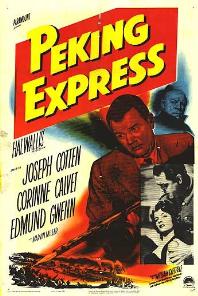Peking Express (film)
| Peking Express | |
|---|---|

Theatrical release poster
|
|
| Directed by | William Dieterle |
| Produced by | Hal B. Wallis |
| Written by |
|
| Starring | |
| Music by | Dimitri Tiomkin |
| Cinematography | Charles Lang |
| Edited by | Stanley Johnson |
| Distributed by | Paramount Pictures |
|
Release date
|
|
|
Running time
|
95 minutes |
| Country | United States |
| Language | English |
| Box office | $1.1 million (US rentals) |
Peking Express is a 1951 adventure film made by Paramount Pictures. It is the second remake of Paramount's earlier Shanghai Express (1932), remade as Night Plane from Chungking (1943) and the first film to be set in the newly emerged People's Republic of China (PRC). It was directed by William Dieterle and produced by Hal B. Wallis, from a screenplay by John Meredyth Lucas, based on the original screenplay by Jules Furthman and Harry Hervey. The film stars Joseph Cotten, Corinne Calvet and Edmund Gwenn with Marvin Miller.
Peking Express is notable for its production values. The music score was composed by Dimitri Tiomkin, the cinematography was by Charles Lang, the art direction by Franz Bachelin and Hal Pereira and the costume design by Edith Head.
Doctor Michael Bachlin (Joseph Cotten), is in Shanghai investigating a missing shipment of medical supplies for the United Nation's World Health Organization. He must travel to Peking on the express train with other passengers, Father Joseph Murray (Edmund Gwenn), and Kwon (Marvin Miller), a mysterious businessman. Just before the train leaves, Kwon's son, Ti Shen (Robert W. Lee), attempts to board, but his mother, Li Eiu (Soo Yong), has him arrested by Nationalist agents, before boarding the train herself.
...
Wikipedia
